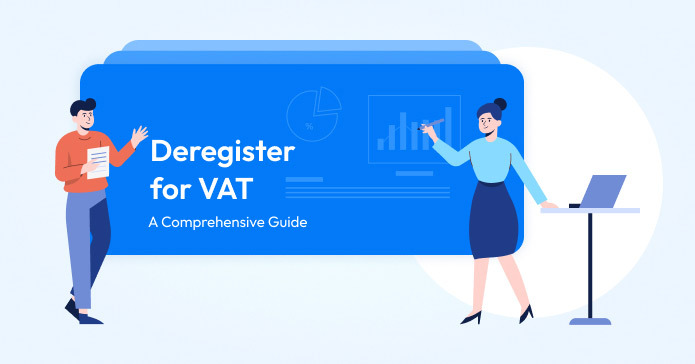When to deregister for VAT? You must deregister for Value Added Tax (VAT) if you are no longer eligible. Eligibility criteria include your total turnover must be above £85,000 or that you expect it to exceed £85,000 in a month. It is recommended that you register for VAT once you reach £75,000.
You may also need to deregister for VAT if you join a VAT Group or when your business changes in certain ways.
What is a VAT Group?
A Value Added Tax (VAT) group is a special legal arrangement that can be used by two or more businesses within the same corporate group. This arrangement allows the businesses to register for, and pay, VAT as a single entity.
The purpose of the VAT Group is to reduce administrative burden, simplify returns and improve cash flow.
What happens when you cancel your VAT registration?
When you deregister for Value Added Tax (VAT), any debts owed to HMRC become due within 30 days. You must also declare any amounts of VAT claimed on purchases in your last tax return and pay these to HMRC.
You may be able to claim input tax if you have paid VAT on goods or services that you cannot use.
It takes 3 weeks to confirm de-registration. HMRC sends you a letter to acknowledge your deregistration and provide details of the date that it takes effect from or an online form to your VAT account with gov.uk
How to cancel your VAT Registration
You must complete the online form for HMRC when cancelling your VAT registration. You will need your:
- Unique Taxpayer Reference (UTR)
- Company name
- Company address - VAT registration number
You will also need to provide a reason for cancelling your registration and the date you want it to take effect from.
Once you have submitted the form, HMRC will review it and contact you if they have any queries or require further information. Once approved, HMRC will send you a letter confirming your deregistration.
Deregister for VAT form is VAT7 and it's available here.
What happens after you cancel your VAT?
You need to file a one last VAT form and pay any outstanding VAT. HMRC will then send you a final letter confirming your deregistration.
After cancelling your registration, you must keep records of sales and purchases for six (6) years from the date of deregistration. This is to ensure that if there are any discrepancies in the returns submitted by yourself or your customers, HMRC can investigate and take action where necessary.
It is worth noting that once you deregister for VAT, you can no longer reclaim the VAT on purchases made prior to your cancellation. You will need to consider this carefully when deciding whether to cancel or not - if the costs of these items are significant, it may be more beneficial to remain registered and spread out the cost over time.
If you are using the cash accounting scheme when cancelling your registration, you should provide HMRC with details of any outstanding payments or credits that need to be claimed upon 2 months of deregistration.
Is it Worth Deregistering for VAT?
The decision to deregister for VAT is a big one and should not be taken lightly as there are many factors to consider. It is worth speaking to a tax advisor or accountant to ensure that you are making the right decision.
Under some circumstances, it may be beneficial to deregister for VAT as it can simplify administration and reduce costs. However, if you are a business with regular turnovers above the £85,000 threshold, then it is unlikely to be worthwhile. Also, it comes with less admin as you no longer need to retain your VAT receipts.
Conclusion
It is important to consider all the factors before deciding whether or not to deregister for VAT. It may be beneficial in some circumstances such as when turnover is below £85,000 and it can simplify your administration. However, if you are a business with regular turnovers above the threshold, then it is unlikely to be worthwhile.
If you decide that you do need to deregister for VAT, you should complete the online form on HMRC’s website and they will review your application. Once approved, they will send you a letter confirming your deregistration. You must then file a one last VAT form and pay any outstanding taxes before your deregistration is complete.
It is also worth noting that once you have cancelled your registration, you will no longer be able to reclaim the VAT on purchases made prior to your cancellation. You must therefore consider this carefully when making the decision.
Finally, it is important to keep accurate records of sales and purchases for six (6) years from the date of deregistration as this may help HMRC investigate any discrepancies in returns submitted by yourself or your customers.
Deregistering for VAT can be a complex and lengthy process and should only be done with the help of a tax advisor or accountant to ensure that you make the right decision for your business.
For any further assistance, we are happy to help you deregister your business for VAT.
FAQs
What is the form I need to complete when cancelling my VAT registration?
The form you need to complete is called VAT7 and it`s available here.
What happens once I cancel my VAT registration?
Once you have cancelled your registration, any debts owed to HMRC become due within 30 days. You must also declare any amounts of VAT claimed on purchases in your last tax return and pay these to HMRC. It takes 3weeks to confirm de-registration after which HMRC sends you a letter to acknowledge your deregistration and provide details of the date that it takes effect from or an online form.
Do I need to keep records of sales and purchases after deregistering for VAT?
Yes, you must keep records of sales and purchases for six (6) years from the date of deregistration. This is to ensure that if there are any discrepancies in the returns submitted by yourself or your customers, HMRC can investigate and take action where necessary. It is also worth noting that once you have cancelled your registration, you will no longer be able to reclaim the VAT on purchases made prior to your cancellation. You must therefore consider this carefully when making the decision.
Is it worth deregistering for VAT?
The decision to deregister for VAT is a big one and should not be taken lightly as there are many factors to consider. It is worth speaking to a tax advisor or accountant to ensure that you are making the right decision. Under some circumstances, it may be beneficial to deregister for VAT as it can simplify administration and reduce costs. However, if you are a business with regular turnovers above the £85,000 threshold, then it is unlikely to be worthwhile.
What happens if I deregister for VAT and my turnover goes above the £85,000 threshold?
If your turnover exceeds the £85,000 threshold after deregistration, you must register again within 30 days. Failure to do so can result in a penalty.
You must also begin charging VAT on all sales again once you have re-registered, and make sure that any customers who were previously exempt from paying VAT are now charged the correct amount. If you fail to do this, you may be liable for a penalty. You should also bear in mind that when you re-register, there is a possibility of having to pay backdated VAT on any purchases made prior to your re-registration. This should be considered when deciding whether it is worth deregistering for VAT in the first place.
What other costs are associated with cancelling my VAT registration?
There may be a cost associated with cancelling your VAT registration, as some items may be subject to VAT when purchased. This should be taken into consideration when deciding whether to cancel or not - if the costs of these items are significant, it may be more beneficial to remain registered and spread out the cost over time.
Additionally, you must also provide HMRC with details of any outstanding payments or credits that need to be claimed within 2months of deregistration. If you fail to do this, you may be liable for a penalty.













